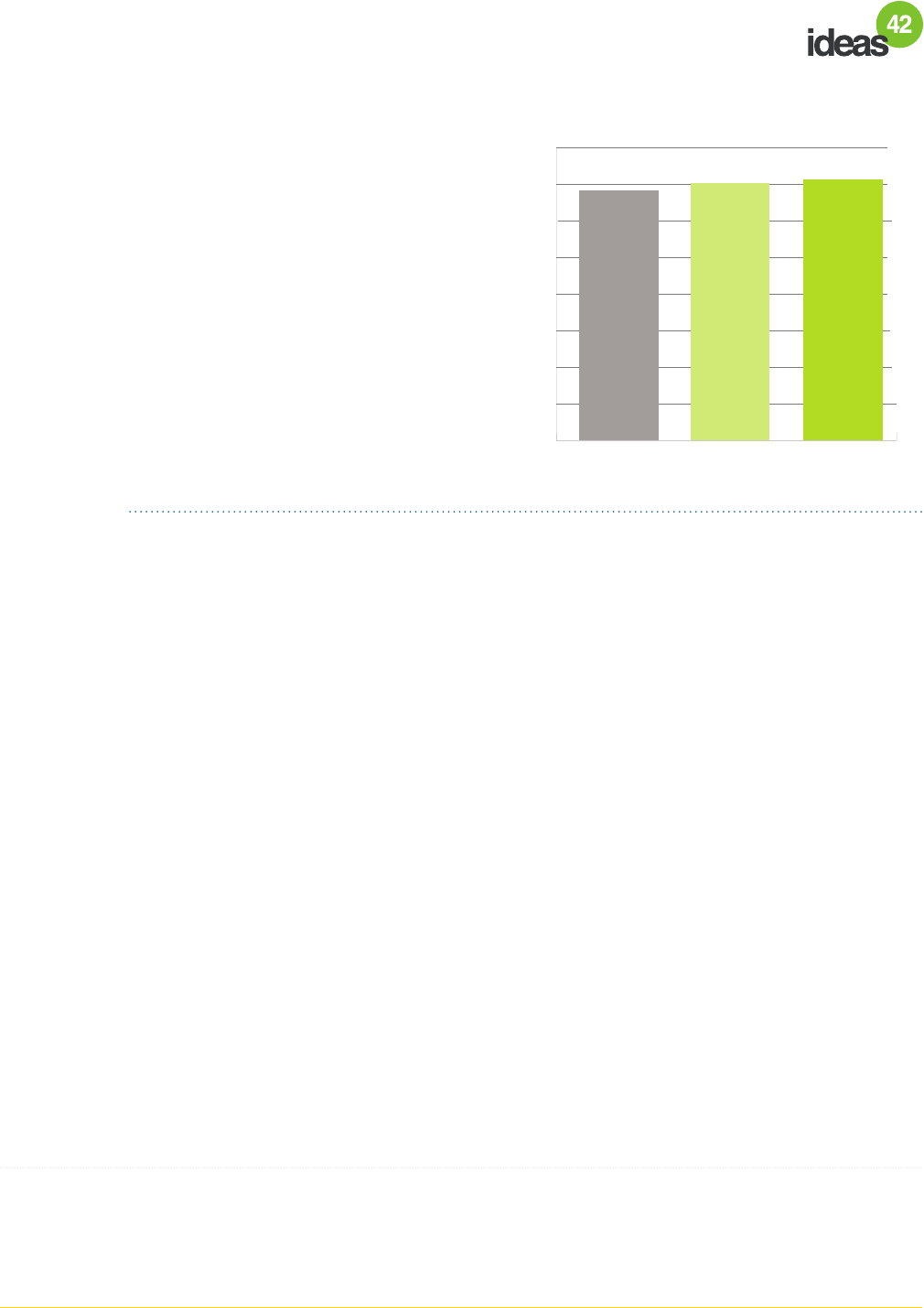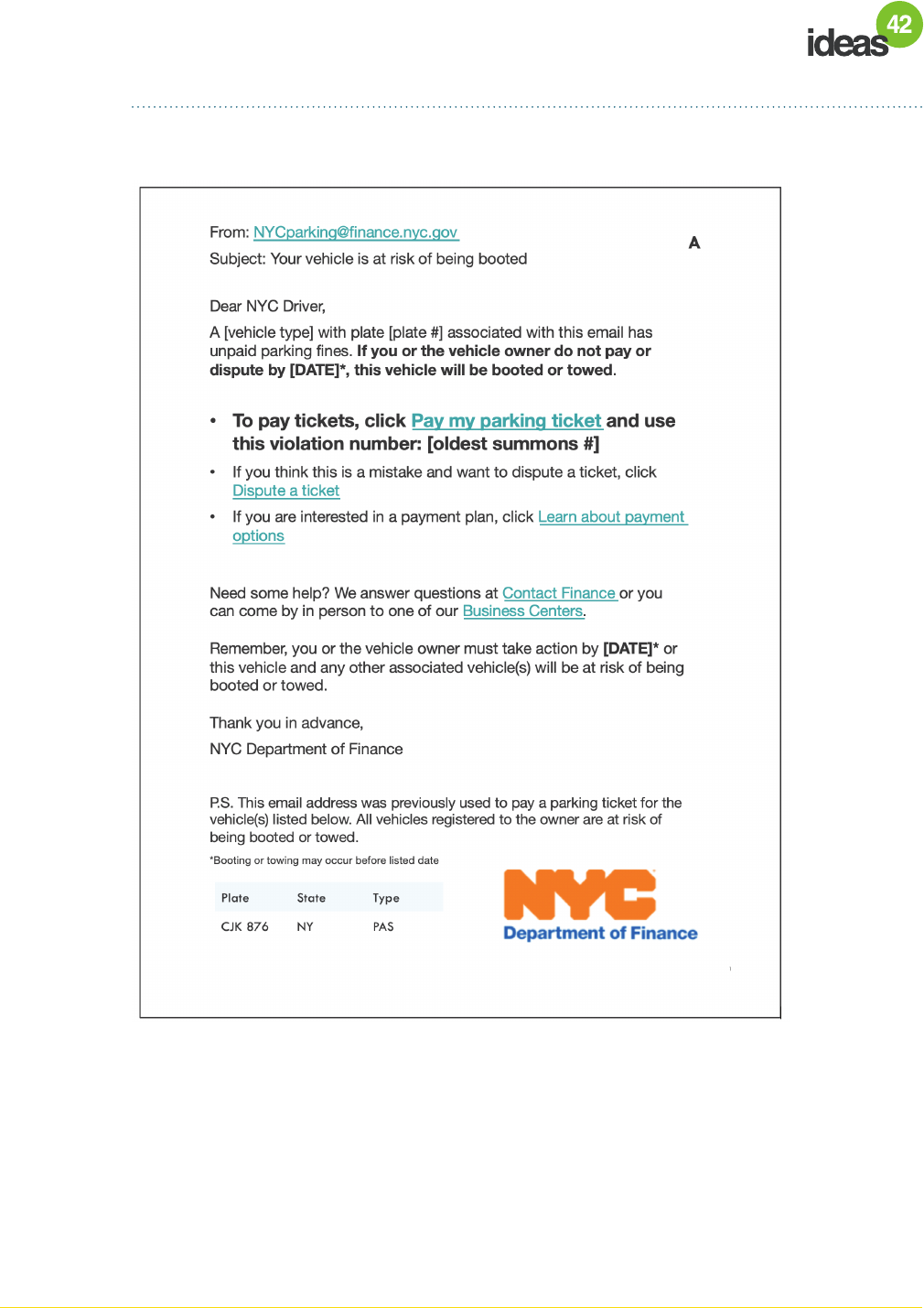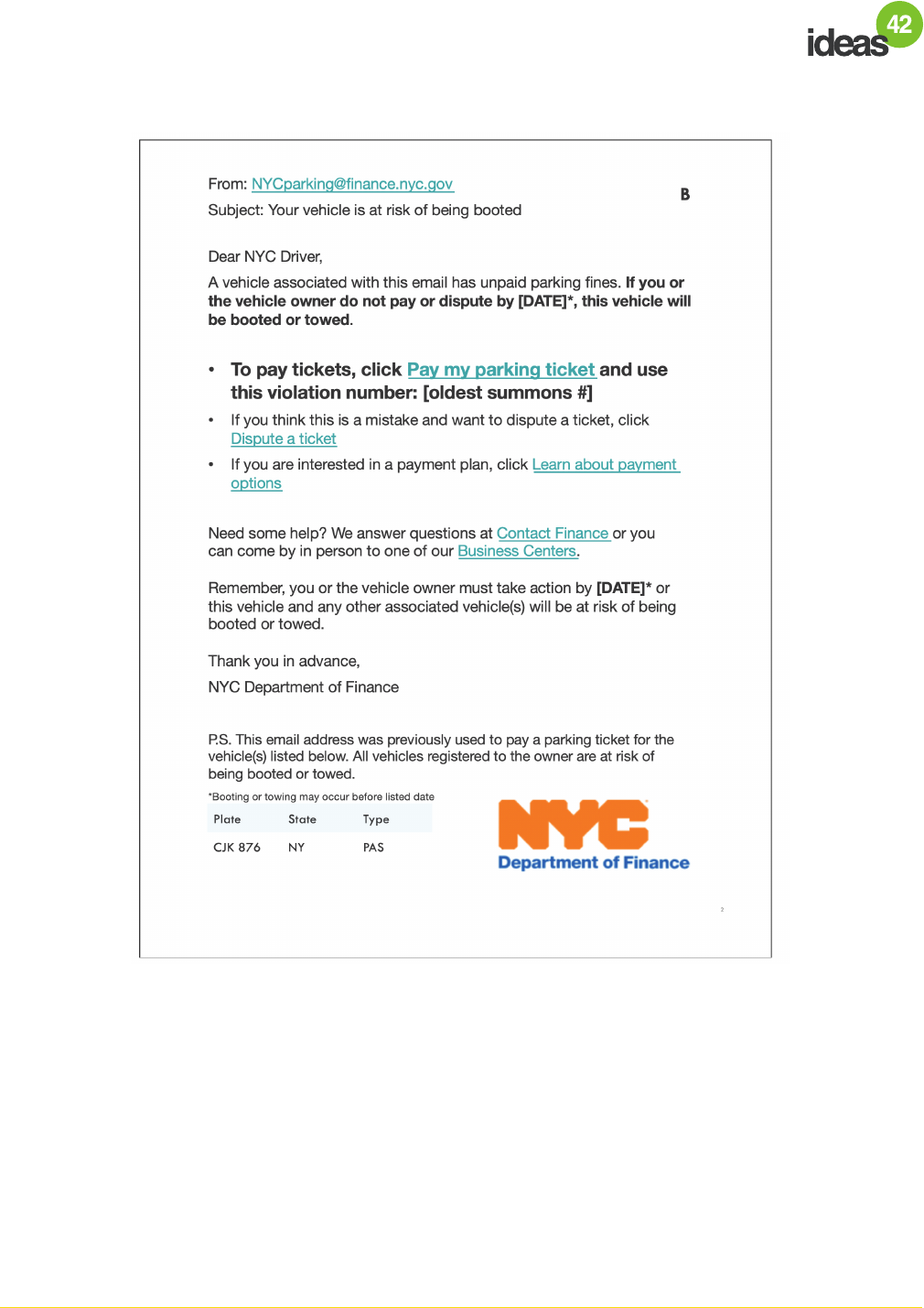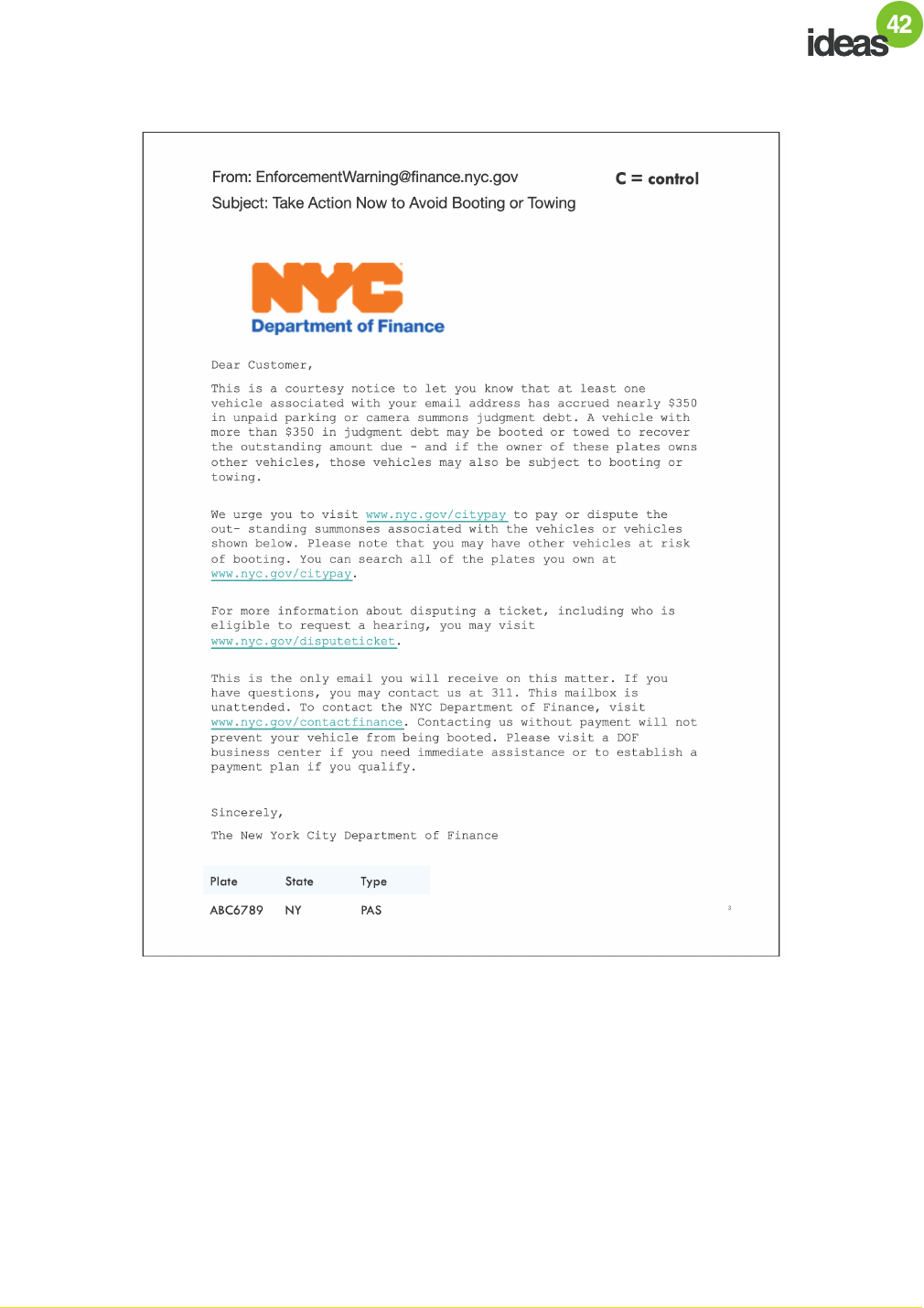
HELPING NEW YORK CITY DRIVERS AVOID GETTING BOOTED: Behaviorally informed warning emails to reduce unpaid parking ticket debt | 1
ideas42
Behaviorally informed warning emails to reduce unpaid parking ticket debt that leads to vehicle booting
A behavioral redesign of an email lowered the number of drivers subject to vehicle
booting and towing in New York City. Inexpensive to implement, the redesigned
“boot warning” email helped drivers avoid a significant and unanticipated
financial cost that is particularly burdensome for low-income households.
Summary
About 8,700 NYC drivers become at risk for booting or towing every
month due to unpaid parking ticket debt. If booted or towed, drivers
must often pay over $700 to regain access to their car—an unanticipated
financial cost that can be particularly burdensome for those living in
low-to-moderate income households. Outside of the financial burden,
losing access to one’s vehicle for any period of time can be disruptive—
hindering those who rely on their vehicles to work and impacting drivers’
lives.
To prevent this situation for drivers, the Department of Finance (DOF)
sends a warning email to drivers approaching $350 in combined ticket
fees and fines—the threshold that triggers booting and towing. The email
urges drivers to address their tickets by paying, disputing or joining a
payment plan. To improve the ecacy of the warning email and lower the
number of drivers eligible for booting, the DOF reached out to the New York City Behavioral Design Team
(NYC BDT), a partnership between ideas42 and the NYC Mayor’s Oce of Operations, to redesign the
email.
For our redesign, we made changes to the email’s sender address, subject line, and text to increase the
number of drivers who open the email, read the email in enough detail to understand how to address their
tickets and ultimately take action to avoid booting or towing. A randomized controlled trial found that the
two versions of the redesigned email lowered the number of drivers who became eligible for booting by
an average of 10.4%.
1
As a result of this encouraging finding, the City decided to scale our most successful
behavioral email design to all drivers approaching the booting or towing limit. While NYC has temporarily
ceased the booting of vehicles as a result of the pandemic, the redesigned email will help an estimated
2,500-2,600 New Yorkers avoid booting or towing (and associated costs and disruption of their lives)
every year once booting resumes.
1
This result is statistically significant at the 1% level (p<0.01)
Helping New York City Drivers
Avoid Getting Booted
JAN 2022
Highlight s
} Parking tickets that go unpaid
lead to risk of car booting or
towing.
} NYC sends warning emails
to drivers to pay their tickets
before being booted, but a
redesign improved recipients’
follow through.
} The goals of the email
redesign are: 1) increase open
rates, 2) encourage recipients
to act promptly, and 3) make it
easier for drivers to act.

ideas42
HELPING NEW YORK CITY DRIVERS AVOID GETTING BOOTED: Behaviorally informed warning emails to reduce unpaid parking ticket debt | 2
Why do parking tickets go unaddressed?
Before we could design a better email, we first needed to understand why tickets go unaddressed. We
reviewed the communications ticketholders received prior to being booted (the tickets themselves and
the existing warning email). We went through each step required to pay or dispute a ticket or to request
a payment plan ourselves. Finally, we reviewed administrative data on ticketholders at-risk for booting or
towing to better understand the population of drivers approaching boot eligibility.
Our review identified two key insights about why drivers may not open the boot warning email—the first
step to ultimately addressing their tickets:
} Since people have limited attention, drivers may not notice the boot warning email in their inbox
or may ignore it because it does not appear urgent compared to their other emails.
} Because thinking you owe money can be painful, especially if you know you cannot repay, drivers
may ostrich and avoid opening the email about their impending booting.
To address their tickets, drivers need to read the warning email closely enough to understand their
options and then act to address their ticket. Our review of the email itself and the dispute and repayment
processes revealed that drivers may not address their tickets for the following reasons:
} The boot warning email is cognitively taxing to read with unclear choice framing—using
overly complex language with no clear prioritization of information. Drivers, confronted with this
confusing email, may stop reading before they learn how to address their ticket.
} Drivers may experience present bias and procrastinate paying o their ticket, because the costs
of paying a ticket now (both to their finances and time) seem concrete compared to the more
abstract risk of booting or towing at some unspecified time in the future.
} Administrative hassles in disputing or paying tickets, including figuring out where to go online
and what information to provide, may place an additional cognitive cost on ticketholders, causing
them to give up or delay action until their vehicles are eligible to be booted.
Simple design elements to boost efficacy
To boost the number of drivers who pay, dispute, or join a payment plan, the BDT designed email prototypes
with three main goals in mind: 1) increase open rates, 2) encourage recipients to act promptly, and 3) make
it easier for drivers to act.
Increasing Open Rates
Before drivers open the email, they are exposed to two key pieces of information—the sender and the
email subject line. To boost email open rates, the BDT adjusted both. The BDT changed the sender,
previously EnforcementWarning@finance.nyc.gov, to NYCparking@finance.nyc.gov for two reasons. First,
the old address “EnforcementWarning” could appear fraudulent to those quickly skimming their email, so
a switch to the less “spammy” sounding “NYCparking” might increase open rates. Second, switching from

ideas42
HELPING NEW YORK CITY DRIVERS AVOID GETTING BOOTED: Behaviorally informed warning emails to reduce unpaid parking ticket debt | 3
“EnforcementWarning” to the more neutral sounding “NYCparking” address may lower drivers’ aversion
to opening what previously sounded like a harsh email. Indeed, a previous parking ticket experiment, run
by the BDT, with a similar population of NYC ticketholders found that a softer, non-blaming tone on parking
ticket envelopes motivated drivers with expensive tickets to address their parking debt.
To improve upon the original email subject line, “Take Action Now To Avoid Booting or Towing,” we
developed three other subject lines—one of which was action-based, “Pay now to avoid towing,” another
which highlighted risk, “Your vehicle is at risk for towing,” and a final one, which both highlighted risk and
was personalized with drivers’ plate number—“Action Needed: Plate CJK876 at risk for towing.” To gain
insight into which subject line might produce the best email open rate, the BDT performed an online test
using Amazon’s Mechanical Turk (MTurk), a crowdsourcing platform that allowed us test the eectiveness
of our prototypes online with 6,000 remotely located people. The results did not clearly show one subject
line to be more eective at increasing open rates. After discussion with the DOF, we decided to use
the subject line “Your vehicle is at risk for booting” for our pilot with NYC drivers because it succinctly
highlighted the most likely initial outcome for drivers—booting (not towing)—if drivers did not address their
tickets. The piloted subject line also reduced the ambiguity of the original subject line, which suggested
drivers could be booted or towed.
Encouraging Recipients to Act Promptly
Because drivers need to understand the boot warning email before they can act, the redesign sought
to limit the complexity of the language and cut out extraneous information. For example, rather than
beginning the email with “This is a courtesy notice to let you know that at least one vehicle associated
with your email address has accrued nearly $350 in unpaid parking or camera summons judgement debt,”
the redesign cut the jargon and simply stated “A vehicle associated with this email has unpaid parking
fines.”
Drivers need to act promptly to ensure their vehicles do not get booted or towed. Procrastinating for just
a few weeks can mean hundreds of dollars of additional costs in booting, towing, and execution fees. To
reduce procrastination around addressing these fines, we included a bolded deadline in the body of the
email, by which drivers needed to act. Directly following this deadline, we included three succinct bullets
explaining how drivers could address their tickets, so drivers could easily understand all their options.
Personalization may increase the perceived authenticity and relevance of automated messages. Indeed,
our pre-pilot MTurk test suggested personalization might be eective at increasing the likelihood a driver
attempts to address their tickets. When compared to the email the DOF previously sent drivers, a higher
percentage of MTurk users attempted to address their ticket (by clicking a link in the email) when they
reviewed our behaviorally redesigned email, which included personalized elements like the driver’s plate
number.
2
To explore whether additional personalized elements would ultimately increase the number of
drivers who act promptly in the real world, we created one version of the design that featured the driver’s
2
The email included other behavioral elements described in this brief, like simplified language and deadlines, so we are not able to isolate the
impact of personalization alone in our MTurk testing.

ideas42
HELPING NEW YORK CITY DRIVERS AVOID GETTING BOOTED: Behaviorally informed warning emails to reduce unpaid parking ticket debt | 4
vehicle make and model—like “Toyota Highlander”—and plate number in the first sentence of the email.
We piloted this email with NYC drivers against an identical version with these personalized elements
removed.
Making it Easier to Address Tickets
Since seemingly small hassles can derail individuals from following through on their intentions, the
redesign sought to streamline the repayment and disputation process to increase follow through. One
hassle inherent in the previous email was that it hyperlinked to one general page for those who wanted
to dispute or pay. From that page, drivers had to find and navigate to the specific payment or disputation
pages—which were not easy to locate. To cut steps, the redesign provided separate links, which sent
drivers directly to either the payment or dispute screen.
Once drivers navigated to the payment or dispute page, they were prompted to enter their summons
number. The redesigned emails included the summons number next to the payment link in the email to
reduce the hassles of finding it, which could have prevented some drivers from following through on their
intention to address their tickets.
Immediate positive impact for drivers
Over 12 weeks in the spring and summer of 2019,
more than 26,000 drivers approaching boot eligibility
participated in our randomized controlled trial. These
drivers were split randomly into three groups. One group
received the control “business-as-usual” email the DOF
previously sent to all drivers approaching the booting
limit. The other two groups received our behaviorally
redesigned emails, which were identical to each
other except for the first sentence. The “personalized”
behaviorally redesigned email included the driver’s
vehicle type and plate number in the first sentence—
reading “A [vehicle type] with plate [plate #] associated
with this email has unpaid parking fines.” The “generic”
behaviorally redesigned email simply read, “A vehicle
associated with this email has unpaid parking fines.”
To understand if our designs were successful, we examined whether drivers in the control or treatment
groups were no longer eligible for booting. Drivers become ineligible for booting if they successfully
dispute their ticket, join a payment plan or pay enough money that they owe less than $350 in combined
fees and fines. We found that both redesigned emails outperformed the business-as-usual email—on
0%
5%
10%
15%
20%
25%
Personalized RedesignGeneric Redesign
This result is statistically significant at the 1% level (p<0.01)
Business as usual
23.1%
21.4%
***
20.8%
***
Boot eligibility

ideas42
HELPING NEW YORK CITY DRIVERS AVOID GETTING BOOTED: Behaviorally informed warning emails to reduce unpaid parking ticket debt | 5
average reducing boot eligibility by 2.4 percentage
points from the baseline of 23.1%, a 10.4% change.
3
The
personalized email showed a slightly larger reduction in
eligibility than the generic email.
4
Relatedly, we found the redesigned emails increased
the percentage of drivers who made any dollar payment
on their tickets (whether or not it was sucient to end
their boot eligibility) by 2.9 percentage points from our
baseline of 68.3%, a 4.2% change.
5
We also observed an
advantage to personalization, with the personalized email
showing a slightly larger increase in the percentage of
drivers making payment compared to the generic email.
6
Takeaway
The findings from our intervention show that a simple email redesign can be a cost-eective way to
prevent an unnecessary financial burden for drivers. Since the redesigned email was inexpensive to
implement and eective in reducing boot eligibility, the DOF scaled the personalized redesign to all New
York City drivers approaching the parking ticket fines and fees limit. Based on evidence from the pilot,
scaled emails will help an estimated 2,500-2,600 additional vehicle owners avoid eligibility for booting
every year.
The guiding principles of our redesign—limiting complexity to boost comprehension, softening language
to reduce drivers’ aversion to the email, providing a deadline with concrete steps to inspire action, and
reducing hassles—are broadly applicable across NYC government communications with residents. Where
possible, government practitioners should look for opportunities to revise communications to maximize
their impact for the people they serve.
3
This result is statistically significant at the 1% level (p<0.01)
4
This result is not statistically significant
5
This result is statistically significant at the 1% level (p<0.01)
6
This result is not statistically significant
0%
10%
20%
30%
40%
50%
60%
70%
80%
Personalized RedesignGeneric RedesignBusiness as usual
71.2%
***
70.2%
***
68.3%
Made Payment
This result is statistically significant at the 1% level (p<0.01)



